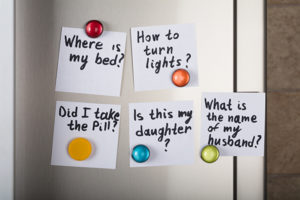April 19, 2019

The incidence of Alzheimer’s disease is on the rise according to the new 2019 report.
The Alzheimer’s Association has made available its 2019 Facts and Figures Report, and with a staggering 5.8 million Americans currently diagnosed with the disease – including 1 out of every 10 older adults – it’s important for all of us to be familiar with the most current innovations in research and treatments.
According to the report, the number of Americans diagnosed with Alzheimer’s is expected to explode from 5.8 million in 2019 to an estimated 13.8 million in 2050. And while the effects are greatest on older adults, the condition begins to create alterations in the brain a staggering two decades or more before signs or symptoms are apparent.
If you are among the countless family members providing care for a senior with Alzheimer’s, you are quite aware of the investment in time needed: combined with other family caregivers, totaling 18.5 billion hours in 2018 alone. In fact, 83% of dementia care is provided by family and friends. And the impact on a caregiver’s health is substantial, with close to 60% reporting emotional stress and nearly 40% suffering from physical stress.
Risk factors have also been updated in this year’s report, and include:
- Age: Unsurprisingly, risk spikes noticeably as we age, from as small as 3% in the 65 – 74 age-group, to 17% in those ages 75 – 84, to an astonishing 32% for anyone age 85 and older.
- APOE gene: Of the three types of the APOE gene (e2, e3, and e4), which carries cholesterol in the bloodstream, the e4 form is linked to the greatest prevalence of the disease.
- Family background: People who have at least one first-degree relative (parents, siblings) have an increased risk for developing Alzheimer’s, and the risk increases when shared lifestyle and environmental aspects are in play (i.e. unhealthy eating or obesity).
Of significant importance is the finding that despite the fact that healthcare providers are advised to regularly measure cognitive functioning for all seniors, only 16% of individuals over age 65 report having a routine evaluation, and more than half have never been given an evaluation at all – in spite of the fact that 94% of doctors noted the value of such an evaluation.
Per Joanne Pike, Dr.P.H., chief program officer for the Alzheimer’s Association, “Early detection of cognitive decline offers numerous medical, social, emotional, financial and planning benefits, but these can only be achieved by having a conversation with doctors about any thinking or memory concerns and through routine cognitive assessments.”
Continuum, your trusted provider of in-home care in St. Louis, continues to be dedicated to following the most current advancements in Alzheimer’s disease, and to supply the excellent, highly trained care that allows for the best possible quality of life at all times for persons diagnosed with dementia. Email us or call (314) 863-9912 to get more detailed educational resources pertaining to Alzheimer’s, or to learn more about our specialized in-home dementia care services.
